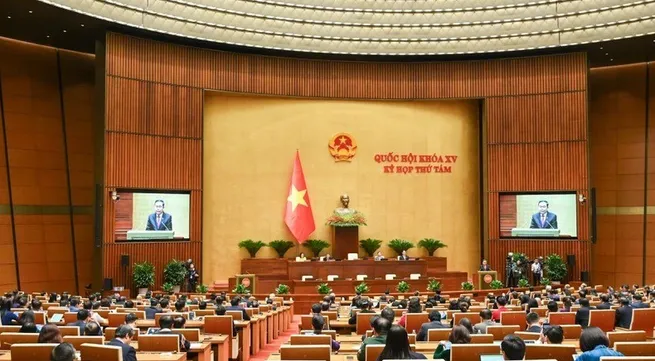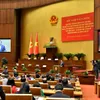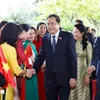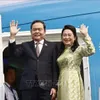Creating a foundation for national development in the new era

During this session, the National Assembly reviewed and approved a substantial amount of work, including many complex issues that are urgent and relevant across various sectors.
With a spirit of reform in law-making and coordination between the National Assembly Party Committee and the Government's Party Committee, the National Assembly timely made important decisions to resolve difficulties, eliminate bottlenecks, mobilise resources to facilitate socio-economic development and improve people's lives.
The National Assembly deputies voted to pass 18 laws with high approval rates, including laws and resolutions that receive much attention from businesses and citizens.
Additionally, the National Assembly adopted 21 resolutions, including four legal normative resolutions, plans for socio-economic development, state budget estimates, and the allocation plan for the central budget 2025, alongside many urgent proposals addressing national socio-economic issues.
Personnel matters were also carried out strictly following Party regulations and state laws, achieving high consensus among National Assembly deputies.
At the opening session of this meeting, General Secretary To Lam delivered an important speech on strongly innovating the organisation and operation of the National Assembly.
He pointed out existing shortcomings that need to be urgently addressed to avoid them from hindering the country’s development opportunities in this new era. This is a responsibility for the entire political system, particularly the National Assembly and its deputies.
The national development in the coming years requires continued building and perfection of the socialist rule-of-law state. This involves promptly bringing Party policies to life and addressing critical national issues. Urgent actions are needed to eliminate three major bottlenecks: institutional framework, infrastructure, and human resources.
Another crucial requirement is executing key tasks to bring freshly passed laws and resolutions into practical application.
During the National Assembly’s 8th working session, deputies analysed economic challenges and proposed numerous solutions.
In the coming time, the Government and relevant ministries must take responsibility by incorporating deputies' opinions to take immediate action on commitments made before the National Assembly and citizens nationwide.
Close observation of real situations will enhance analytical capabilities, timely policymaking, and effective solutions to achieve goals set in the socio-economic development plan for 2025 and the 13th Party Congress’s Resolution.
Emphasising strong legislative reform, law-making must be linked with law enforcement, which is crucial in preventing wastefulness. Leaders of the National Assembly urged the Government, National Assembly and State-run agencies, and National Assembly delegations to enhance innovative thinking in legislation and effective law enforcement that creates positive ripple effects throughout the political system and society.
Another urgent task is to promptly issue detailed regulatory documents while regularly reviewing the implementation of promulgated policies for timely adjustments. Establishing legal frameworks is also necessary for new issues and trends that can drive immediate and long-term development breakthroughs.
Restructuring and streamlining political system organisations is a vital task drawing public attention. During this session, there was a strong commitment from the National Assembly, National Assembly Standing Committee, National Assembly’s Ethnic Council, National Assembly Office, and agencies run by the National Assembly Standing Committee to reorganise into a "leaner, more robust" structure while ensuring accountability against wastefulness and streamlining the staffing process.
In restructuring political organisations, it is essential to prioritise ideological work alongside organisational tasks, which priorities should be paid to enhance awareness among officials, Party members, and workers.
Entering 2025 - the year for breakthroughs, the National Assembly continues to collaborate with the Government and other agencies and organisations of the political system to make a joint effort to realise socio-economic development goals while contributing to successfully implementing the resolutions of the 13th Party Congress, making preparations for Party congresses at all levels in the lead-up to the 14th National Party Congress, laying a foundation for the country’s robust innovation and development in this new era.
Building on the positive outcomes from this working session, immediate tasks include developing a plan for summarising the term of the 15th National Assembly, planning structures and personnel for the upcoming 16th National Assembly and directing preparations for elections of deputies to all-level People's Councils for 2026-2031 tenure - an event anticipated by citizens in the hope of further innovative achievements of the country.
Tags:





